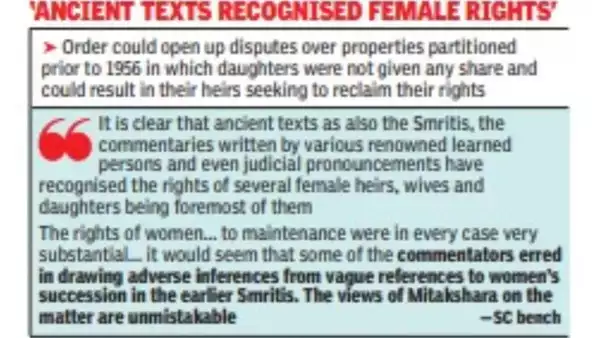The Supreme Court on Thursday conferred daughters with equal right to father’s property even prior to codification of Hindu personal laws and enactment of the Hindu Succession Act in 1956 and said that the law of inheritance would apply to partition of properties even if the father had died intestate before 1956.
A bench of Justices S Abdul Nazeer and Krishna Murari gave the judgment and said self-acquired properties of a person, who died intestate in 1949, would devolve on his sole daughter, despite the man admittedly living in a joint family, and could not have passed on to the deceased person’s brother on the basis of the survivorship law in force prior to 1956 and upon his death to his children.
Writing the judgment, Justice Murari said, “Since the property in question was admittedly the self-acquired property of Marappa Gounder, despite the family being in state of jointness upon his death intestate, his sole surviving daughter Kupayee Ammal will inherit the same by inheritance and the property shall not devolve by survivorship.”

Referring to the ancient texts and Smritis, Justice Murari said, “It is clear that ancient text as also the Smritis, the commentaries written by various renowned learned persons and even judicial pronouncements have recognized the rights of several female heirs, the wives and the daughter’s being the foremost of them.” This could potentially open up disputes over properties partitioned prior to 1956 in which the daughters were not given any share and could result in the daughter’s heirs seeking to reclaim their rights over the properties.
Accepting arguments of advocate P V Yogeswaran, counsel for the woman petitioner, the bench said succession of properties prior to 1956 would also include the daughter’s right. “If a property of a male Hindu dying intestate is a self acquired property or obtained in partition of a coparcenary or a family property, the same would devolve by inheritance and not by survivorship, and a daughter of such a male Hindu would be entitled to inherit such property in preference to other collaterals.”
It said, “The rights of women in the family to maintenance were in every case very substantial rights and on whole, it would seem that some of the commentators erred in drawing adverse inferences from the vague references to women’s succession in the earlier Smritis. The views of the Mitakshara on the matter are unmistakable.”
Under the 1956 Act, the bench said, “If a female Hindu dies intestate without leaving any issue, then the property inherited by her from her father or mother would go to the heirs of her father whereas the property inherited from her husband or father-in-law would go to the heirs of the husband.”
The SC had in August 2020 ruled that daughters will have inheritance rights equal to those of sons in the properties of fathers, grandfathers and great-grandfathers right from the codification of the Hindu laws in 1956.
